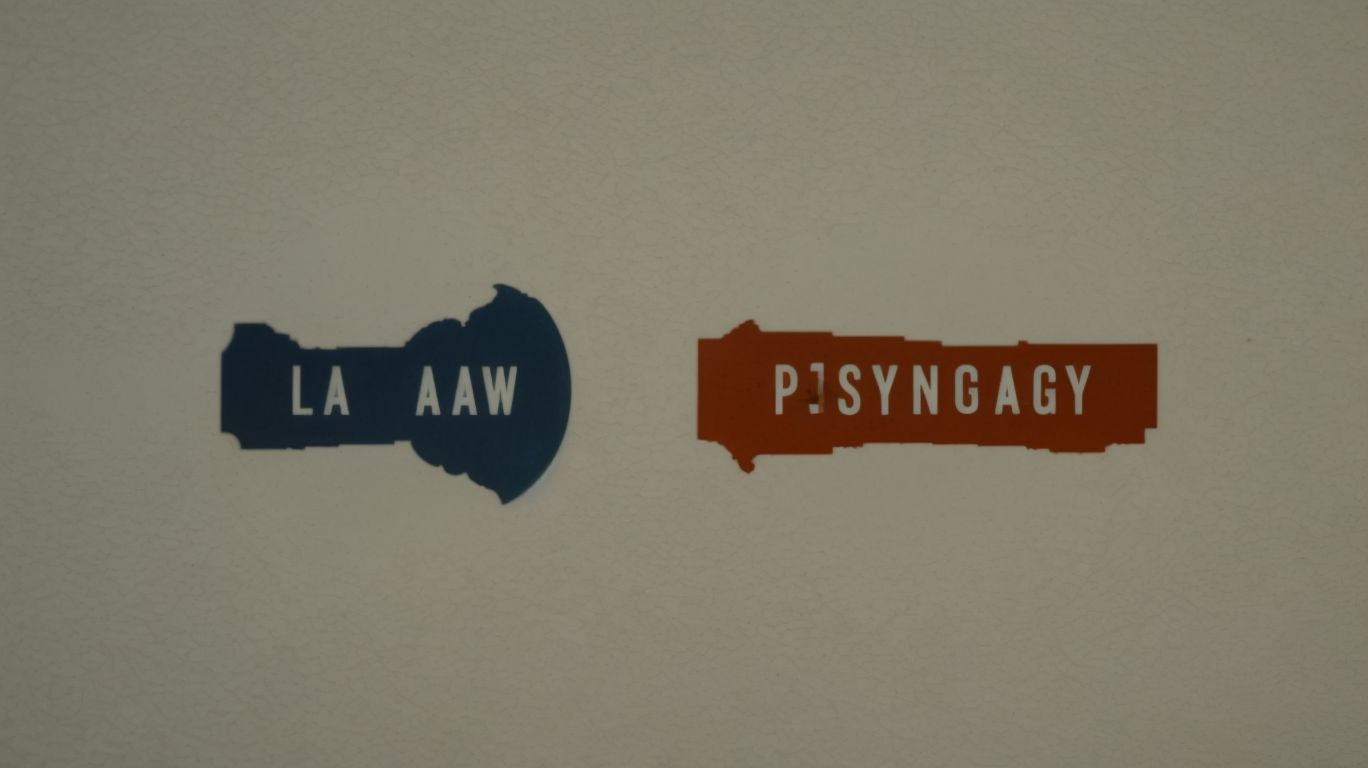The collaboration between psychology and law is a fascinating and complex partnership that has far-reaching implications for both fields. From forensic psychology to legal psychology and clinical psychology in legal settings, the synergy between these disciplines has led to significant advancements in the legal system and a deeper understanding of human behavior.
This collaboration also raises important ethical considerations, such as confidentiality and conflicts of interest. In this article, we will explore the implications, ethical considerations, and real-life examples of the synergy between psychology and law in action.
Contents
- 1 Key Takeaways:
- 2 What Is the Synergy Between Psychology and Law?
- 3 How Do Psychology and Law Collaborate?
- 4 What Are the Implications of the Collaboration between Psychology and Law?
- 5 What Are the Ethical Considerations of the Synergy between Psychology and Law?
- 6 What Are Some Examples of the Synergy between Psychology and Law in Action?
- 7 Frequently Asked Questions
- 7.1 What is the synergy between psychology and law?
- 7.2 How does collaboration between psychology and law work?
- 7.3 What are the benefits of the synergy between psychology and law?
- 7.4 How does psychology inform the legal system?
- 7.5 What are some examples of the synergy between psychology and law?
- 7.6 What are the potential implications of the synergy between psychology and law?
Key Takeaways:
What Is the Synergy Between Psychology and Law?
The synergy between psychology and law encompasses the collaborative exploration of individual abilities and scientific impact within legal contexts, resulting in a dynamic amalgamation of diverse expertise and perspectives.
Psychological insights provide critical understanding of human behavior and mental processes within legal proceedings, influencing jury decision-making, witness credibility assessments, and courtroom dynamics.
Psychological evaluations and assessments offer invaluable input regarding an individual’s mental state, competency, and culpability within the legal framework, thus bridging the realms of human cognition and legal validity.
On the other hand, the law serves as the regulatory framework that incorporates psychological findings into the administration of justice, enshrining fairness, evidence-based practices, and ethical considerations in legal processes.
How Do Psychology and Law Collaborate?
The collaboration between psychology and law is characterized by a dynamic exchange of scientific collaboration, Q-model implementation, and the innovative credit allocation method, fostering an environment of mutual exploration and collective advancement.
Forensic Psychology
Forensic psychology involves the application of synergy networks and network inference methodology to contribute valuable insights and perspectives that enhance the legal system’s understanding of human behavior and decision-making processes.
This specialized branch of psychology delves into the intricate dynamics of human cognition, emotion, and behavior within the legal framework.
By leveraging synergy networks, forensic psychologists can discern the complex interconnectedness of individual and environmental factors that influence criminal behavior.
Through network inference methodology, they analyze and interpret patterns of behavior and psychological dispositions to aid legal professionals in making informed decisions about criminal responsibility, risk assessment, and sentencing.
Legal Psychology
Legal psychology navigates the complexities of legal environments through the lens of synergy, addressing conflicts of interest and stochastic processes, thus contributing to a nuanced understanding of the human psyche within legal contexts.
This multidisciplinary field combines principles of psychology with legal application to illuminate the interplay between cognitive processes, behavior, and the structures of law.
By looking into the intricate dynamics shaping human decision-making, legal psychology uncovers invaluable insights into factors influencing testimony validity, jury decision-making, and the assessment of competence to stand trial.
The synergy between legal and psychological perspectives allows for a comprehensive analysis of the complexities inherent in legal proceedings, fostering a deep comprehension of the impact of legal regulations on human behavior and mental states.
The consideration of conflicts of interest and stochastic processes within legal psychology offers crucial frameworks for evaluating the reliability of evidence, understanding the intricacies of memory recall, and discerning patterns of behavior under legal frameworks.
Clinical Psychology in Legal Settings
The integration of clinical psychology in legal settings encompasses a collaborative approach guided by the additivity rule, offering comprehensive perspectives and insights into the complex adaptive systems inherent in legal contexts.
Collaborative efforts between clinical psychologists and legal professionals are crucial for addressing the multifaceted challenges encountered in legal settings. By applying the principles of the additivity rule, these professionals can combine their expertise to achieve a more profound understanding of individual cases.
This collaborative approach allows for a more nuanced comprehension of the interconnected factors influencing human behavior within the intricate legal framework. It plays a pivotal role in promoting interdisciplinary strategies for intervention and mitigation of psychological issues within legal proceedings.
What Are the Implications of the Collaboration between Psychology and Law?
The collaboration between psychology and law holds profound implications, spanning from enhancing the legal system to addressing ethical considerations, thus shaping the landscape of societal and individual well-being.
When psychology and law intersect, it not only improves the legal system by incorporating insights from human behavior and cognition but also raises important ethical questions about the use of psychological findings in legal proceedings.
This partnership has the potential to influence policies, courtroom procedures, and the treatment of individuals within the judicial system. It can lead to a better understanding of human behavior and decision-making, potentially contributing to the fairer application of law.
This collaboration has far-reaching effects on societal and individual well-being. By integrating psychological knowledge into legal practices, there is an opportunity to promote more effective rehabilitation and support for individuals involved in legal processes, ultimately benefiting the mental health and overall welfare of the community.
It opens avenues for preventive measures and interventions that may help reduce recidivism and address the root causes of criminal behavior.
Improving the Legal System
The collaborative efforts between psychology and law play a pivotal role in improving the legal system, integrating ethical considerations and systems theory to foster a more nuanced and effective approach to justice and societal well-being.
By recognizing the intertwined relationship between human behavior and the legal framework, the application of psychological principles can offer valuable insights into the cognitive and emotional processes influencing decision-making, leading to more informed legal practices and policies.
The incorporation of ethical considerations injects a moral compass, ensuring that legal processes prioritize fairness, equality, and human rights.
Building upon this interdisciplinary foundation, the adoption of systems theory within the legal domain acknowledges the interconnectedness of various components within the justice system, promoting a holistic understanding of its functions and interactions. This comprehensive viewpoint can lead to more effective and equitable interventions, strengthening the fabric of societal well-being.
Enhancing the Understanding of Human Behavior
The collaboration between psychology and law enhances the understanding of human behavior through the integration of clinical psychology and the navigation of stochastic processes, contributing to a more holistic comprehension of individual actions within legal frameworks.
This integration leads to the identification of complex interplays between psychological factors and legal circumstances, fostering a deeper grasp of the motives and decision-making processes of individuals within legal contexts.
By recognizing the influence of psychological principles, such as cognition, emotion, and behavior, legal professionals can gain insights into the drivers behind actions, thereby enabling more informed and effective decision-making within legal proceedings.
The collaboration prompts the development of targeted interventions that consider both the psychological well-being of individuals and the legal implications of their actions, thereby promoting more comprehensive support systems for addressing challenging and intricate legal scenarios.
Providing Support for Victims and Offenders
The collaborative synergy between psychology and law facilitates the provision of comprehensive support for both victims and offenders, leveraging the insights from forensic psychology and individual features to address the complex needs within legal contexts.
Forensic psychology plays a pivotal role in understanding the psychological dynamics underlying criminal behavior, thereby aiding in the assessment and treatment of offenders. By incorporating psychological evaluations into legal processes, it enables the identification of cognitive and emotional factors influencing the actions of individuals within the legal system.
This informed approach not only enhances the understanding of the offenders’ motivations but also contributes to the development of tailored interventions aimed at reducing the risk of reoffending.
The application of psychological principles in legal settings extends to supporting the rehabilitation and reintegration of offenders into society. By addressing the underlying psychological issues that may contribute to criminal behavior, this collaborative effort promotes a more holistic approach to criminal justice, emphasizing the importance of individualized support and tailored interventions to address the complex needs of offenders.
This, in turn, aligns with the broader objective of enhancing public safety and fostering positive outcomes for both offenders and society as a whole.
What Are the Ethical Considerations of the Synergy between Psychology and Law?
The synergy between psychology and law necessitates comprehensive ethical considerations, encompassing confidentiality, competence, and conflicts of interest, thus maintaining the integrity and ethical standards within collaborative endeavors.
In the complex interplay between psychology and law, confidentiality holds paramount importance, as it underpins the trust between professionals and clients, ensuring that sensitive information remains safeguarded.
The ethical imperative to demonstrate competence becomes pivotal, dictating proficiency in understanding psychological principles and legal frameworks to provide informed advice and testimony.
Managing conflicts of interest demands vigilance, as dual roles or loyalties may compromise objectivity. These ethical dimensions underscore the collective responsibility of psychologists and legal practitioners to uphold confidentiality, competence, and transparency, preserving the tenets of justice and well-being.
Confidentiality and Privilege
The ethical considerations of confidentiality and privilege are paramount within the collaborative framework of psychology and law, with legal psychology playing a pivotal role in navigating and upholding these foundational ethical standards.
Confidentiality and privilege are integral components of the trust established between legal professionals and individuals seeking psychological assistance or assessment. The maintenance of confidentiality ensures that sensitive information disclosed during therapy or assessments remains protected from unauthorized disclosure.
Moreover, privilege grants individuals the assurance that the information they share with their legal or psychological advisors is safeguarded from being divulged without their consent, reinforcing the trust essential for productive professional relationships.
Legal psychology, in this context, assists in ensuring that guidelines and laws pertaining to confidentiality and privilege are comprehensively understood and applied in both legal and psychological domains, thereby upholding ethical responsibilities and trust within the collaborative framework.”
Competence and Boundaries
The ethical considerations of competence and boundaries are fundamental in the collaborative nexus of psychology and law, with forensic psychology offering valuable insights and guidelines to uphold and navigate these ethical parameters.
Competence in forensic psychology pertains to the proficiency and capability of professionals to perform within their defined roles, ensuring the provision of accurate assessments and testimony.
Ensuring adherence to ethical boundaries involves a meticulous approach to privacy, confidentiality, and the avoidance of dual relationships, particularly in sensitive legal contexts. Forensic psychologists play a critical role in maintaining objectivity and ethical conduct while interfacing with various legal actors, thereby contributing to safeguarding the rights and well-being of individuals involved in legal proceedings.
Conflicts of Interest
Navigating conflicts of interest stands as a pivotal ethical consideration within the collaborative landscape of psychology and law, with the application of network inference methodology playing a significant role in addressing and mitigating these ethical complexities within legal settings.
This approach allows for the systemic examination of the intricate web of associations between individuals, organizations, and decision-making processes. It sheds light on the potential influence and interconnectedness that may give rise to conflicts of interest.
By leveraging network inference methodology, researchers and legal professionals gain valuable insights into the underlying dynamics and dependencies that can impact ethical decision-making in legal contexts. The integration of diverse data sources within the network inference framework contributes to a comprehensive understanding of the multifaceted relationships and potential ethical dilemmas that may arise.
What Are Some Examples of the Synergy between Psychology and Law in Action?
Several compelling examples showcase the synergy between psychology and law in action, highlighting collaborative success stories and the impactful advancement of scientific careers within legal and psychological domains.
One such powerful example is the implementation of forensic psychology in the criminal justice system. Forensic psychologists work with law enforcement to assess witness credibility, providing critical insights into the human mind’s reliability under stress.
Their expertise in cognitive processes has transformed the accuracy of legal procedures, enhancing the fairness and effectiveness of the judicial system.
The collaboration between clinical psychologists and family courts has significantly improved child custody cases. By integrating psychological evaluations, courts can make more informed decisions that prioritize the child’s well-being, highlighting the tangible impact of psychological expertise within the legal framework.
Assessing Competency to Stand Trial
The assessment of competency to stand trial stands as a poignant example of the collaborative synergy between psychology and law, leveraging forensic psychology and individual abilities to navigate and contribute to legal decision-making processes.
Competency to stand trial is a critical concept within the legal arena, requiring a comprehensive evaluation of an individual’s mental state and capacity to engage effectively in their own defense.
Forensic psychology plays a vital role in this assessment, utilizing its expertise to understand the complexities of human behavior and mental health within the context of legal proceedings. Individual abilities, such as cognitive functioning and decision-making capacity, are meticulously scrutinized to ensure fair and just legal processes.
The collaborative effort between psychological experts and legal practitioners is instrumental in informing and shaping the legal decision-making process, thereby upholding the principles of justice and fairness.
Evaluating Insanity Claims
The evaluation of insanity claims serves as a compelling demonstration of the synergy between psychology and law, showcasing the scientific impact of legal psychology in navigating and contributing to nuanced legal assessments and proceedings.
This collaborative approach involves the thorough examination of mental states, considering factors such as cognitive impairments, delusions, and the capacity for judgment. It integrates the expertise of forensic psychologists and legal professionals to form comprehensive perspectives.
Through the application of established psychological principles and methodologies, insanity claims are subjected to rigorous evaluation. This aims to unravel complex psychological comorbidities and their intersection with legal standards, ensuring the integrity and fairness of legal proceedings.
Providing Expert Testimony in Court Cases
The provision of expert testimony in court cases exemplifies the tangible impact of the synergy between psychology and law, showcasing collaborative efforts and the scientific influence in shaping legal deliberations and outcomes.
This collaboration between psychological expertise and the legal framework not only provides critical insights into human behavior and mental processes, but also aids in evaluating the credibility of witness testimonies and enhancing decision-making processes within the courtroom.
The application of empirical research and psychological principles in legal contexts amplifies the efficacy of legal arguments and influences judicial considerations, thereby significantly impacting the outcomes of court cases. Such collaboration expands the scope of legal reasoning by integrating scientific rigor and psychological understanding into the intricacies of legal proceedings, ultimately contributing to a more comprehensive administration of justice.
Frequently Asked Questions
What is the synergy between psychology and law?
The synergy between psychology and law is the collaboration between the disciplines of psychology and law to better understand and address legal issues. This collaboration can lead to more effective and evidence-based solutions in the legal system, as psychology can provide insights into human behavior and decision-making.
How does collaboration between psychology and law work?
Collaboration between psychology and law can take many forms, such as joint research projects, consultations between psychologists and legal professionals, and interdisciplinary training programs. This collaboration allows for the integration of psychological principles and research into legal practices and policies.
What are the benefits of the synergy between psychology and law?
The synergy between psychology and law can lead to a more nuanced understanding of legal issues, increased efficiency and effectiveness in the legal system, and improved outcomes for individuals involved in legal proceedings. It can also help to bridge the gap between theory and practice in both disciplines.
How does psychology inform the legal system?
Psychology can inform the legal system in many ways, such as providing insights into the factors that influence decision-making, understanding the impact of trauma and mental health on behavior, and identifying effective interventions for reducing criminal behavior. This knowledge can be applied to improve the legal system and promote fair and just outcomes.
What are some examples of the synergy between psychology and law?
Examples of the synergy between psychology and law include the use of psychological assessments in court proceedings, the application of psychological principles in jury selection and decision-making, and the development of therapeutic jurisprudence to promote rehabilitation in the criminal justice system. Collaborative efforts have also led to advancements in areas such as eyewitness identification and child custody evaluations.
What are the potential implications of the synergy between psychology and law?
The implications of the synergy between psychology and law include the potential for more informed and evidence-based legal practices, greater understanding and consideration of psychological factors in legal decision-making, and improved outcomes for individuals involved in the legal system. This collaboration can also lead to a better understanding of the limitations and biases that may exist in the legal system and efforts to address them.







